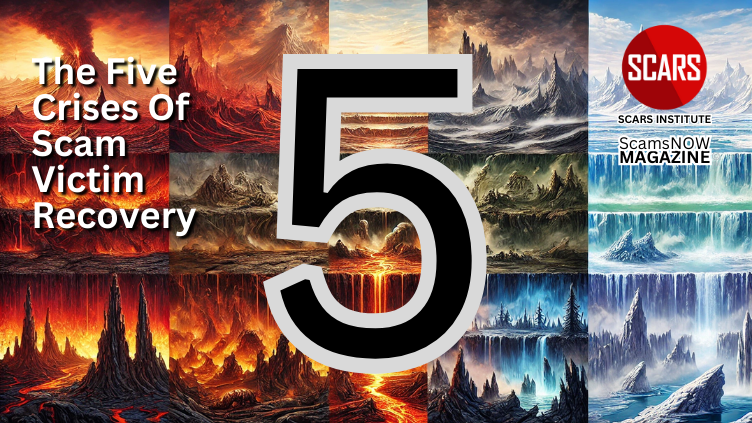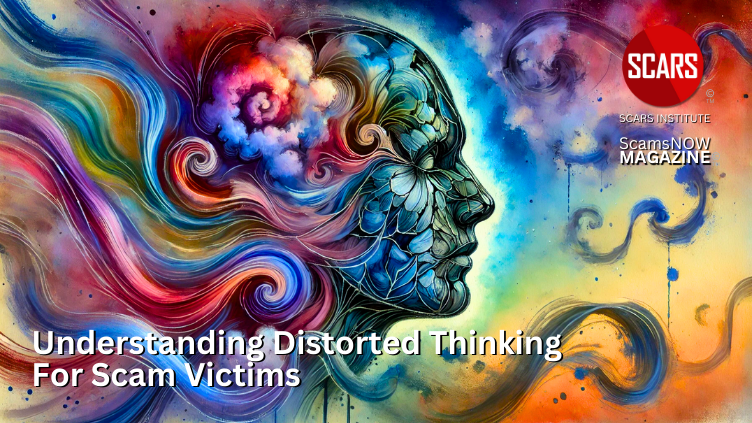Understanding Distorted Thinking for Scam Victims
Understanding and Overcoming Distorted Thinking After a Scam
Primary Category: Scam Victim Recovery Psychology
Intended Audience: Scam Victims-Survivors / Family & Friends
Authors:
• Vianey Gonzalez B.Sc(Psych) – Licensed Psychologist, Specialty in Crime Victim Trauma Therapy, Neuropsychologist, Certified Deception Professional, Psychology Advisory Panel & Director of the Society of Citizens Against Relationship Scams Inc.
• Tim McGuinness, Ph.D., DFin, MCPO, MAnth – Anthropologist, Scientist, Polymath, Director of the Society of Citizens Against Relationship Scams Inc.
About This Article
Cognitive distortions are common after experiencing a scam, leading to skewed perceptions of reality that can hinder recovery by fostering negative emotions like guilt, fear, and shame. These distortions include black-and-white thinking, catastrophizing, self-blame, mind reading, overgeneralization, and imposing rigid rules on oneself.
Understanding and managing these thought patterns involves recognizing when they occur, challenging their validity through reality testing, reframing thoughts to be more balanced, practicing mindfulness, seeking support, educating oneself about scams, setting boundaries, and practicing self-compassion. By addressing these distortions, victims can work towards healing, rebuilding trust in themselves and others, and moving forward with a renewed sense of agency and resilience.

Understanding and Overcoming Distorted Thinking After a Scam
Falling victim to a scam can shake the very foundations of your sense of security, self-worth, and perception of the world. Beyond the immediate financial or emotional damage, one of the subtler but equally devastating effects is the emergence or exacerbation of cognitive distortions. These are essentially mental missteps or biases that can lead to a distorted view of reality, particularly after experiencing betrayal like a scam.
What Are Cognitive Distortions?
Cognitive distortions are patterns in our thinking that can skew our interpretation of events, often magnifying the negative or simplifying complex situations into extremes. Here’s how they might play out for someone recovering from a scam:
- Black-and-White Thinking: You might find yourself thinking in extremes, where everything is either all good or all bad. After a scam, you might believe all people are dishonest or that you’re incapable of making sound decisions.
- Catastrophizing: This involves blowing things out of proportion, imagining the worst possible outcomes. For instance, you might fear that this one scam will lead to lifelong financial ruin or social ostracization.
- Personalization and Self-Blame: You might start to blame yourself entirely for the scam, thinking you were too naive or that your judgment is fundamentally flawed. This can lead to a spiral of self-doubt and guilt.
- Mind Reading: Assuming you know what others think of you, often negatively. You might believe everyone thinks less of you because of the scam, or that new acquaintances have ulterior motives.
- Overgeneralization: From one negative experience, you might conclude that similar situations will always end poorly. For example, thinking every new relationship or investment opportunity is a potential scam.
- Rigid Rules or “Should” Statements: Imposing strict, often unrealistic standards on yourself, like “I should have seen this coming” or “I must never trust anyone again,” which can lead to unnecessary self-pressure and anxiety.
- Labeling: Seeing yourself or others through a single, often negative, lens. Post-scam, you might label yourself as “gullible” or “stupid,” disregarding your overall character or capabilities.
- Jumping to Conclusions: Making negative predictions or assumptions without sufficient evidence, like assuming failure in all future endeavors.
- Emotional Reasoning: Believing that your emotions reflect the truth of the situation. Feeling ashamed might lead you to think you are shameful, regardless of the circumstances.
The Impact on Your Recovery
Cognitive distortions following a scam can profoundly disrupt your path to recovery. These skewed perceptions aren’t just fleeting thoughts; they can embed themselves deeply, creating a cycle of negative emotions that are hard to break. Fear becomes a constant companion, as you might start to see danger and betrayal in every interaction, making it difficult to trust again. This fear can be paralyzing, preventing you from taking the steps necessary for recovery, like seeking professional help or exploring new opportunities.
Guilt and shame are particularly insidious. They can lead you to internalize the scam, viewing it as a personal failing rather than an act of deceit by someone else. This internalization often results in self-blame, where you might repeatedly question your judgment, intelligence, or worth. Such thoughts can trap you in a loop where you’re reluctant to make decisions, fearing another mistake, which only serves to delay your healing process.
Anxiety is another common outcome, with your mind constantly on alert for signs of another scam. This heightened state of vigilance can lead to social withdrawal, as you might prefer to isolate yourself rather than risk further emotional or financial harm. Isolation, in turn, can deepen depression, as you lose the support and perspective that come from interacting with others. The reluctance to engage in new decisions or activities can stagnate your life, keeping you stuck in the aftermath of the scam rather than moving forward.
Furthermore, these distorted thoughts can make you hesitant to seek help, whether from friends, family, or professionals. There’s often a fear of judgment or a belief that you should handle this alone because you “should have known better.” This reluctance to reach out can mean missing out on crucial support that could offer new strategies for coping, provide comfort, or simply remind you that you’re not alone in this experience.
In essence, cognitive distortions post-scam can create a vicious cycle where the emotional toll of the scam exacerbates these thought patterns, which in turn makes recovery more challenging. Breaking this cycle involves recognizing these distortions, challenging them with more balanced thinking, and actively engaging in recovery steps, which might include therapy, community support, or even small daily actions that rebuild your confidence and trust in your decision-making capabilities.
Strategies to Manage Cognitive Distortions
- Recognition: The first step is to become aware of these thought patterns. Recognizing when you’re engaging in distorted thinking is key to challenging it.
- Reality Testing: When you catch yourself in a distortion, pause and evaluate the evidence. Ask, “Is this really true?” or “Is there another way to look at this?” For instance, if you’re catastrophizing, look for evidence of recovery or support around you.
- Cognitive Reframing: Actively work to change your narrative. Instead of “I’m doomed to be scammed again,” try, “I’ve learned from this experience and will be more cautious moving forward.”
- Mindfulness and Grounding: Techniques like meditation, deep breathing, or even focusing on sensory experiences can help ground you in the present, reducing the power of anxious or negative thoughts about the future or past.
- Seek Support: Isolation can worsen cognitive distortions. Connecting with others, whether friends, family, or support groups, can provide a reality check and emotional support. Professionals like therapists can offer structured help in dealing with these patterns.
- Educational Empowerment: Educate yourself about scams and cognitive biases. Knowledge can be a powerful tool in rebuilding trust in your judgment and reducing the likelihood of future victimization.
- Setting Boundaries: After a scam, it’s important to set new boundaries in relationships and financial decisions. This doesn’t mean shutting down but learning to say no when necessary or proceeding with caution.
- Self-Compassion: Treat yourself with the kindness you would offer a friend. Understand that falling for a scam doesn’t define your intelligence or worth. Practice self-forgiveness and patience with your recovery process.
Moving Forward
Recovery from cognitive distortions post-scam is a journey of re-learning trust in oneself and others. It involves slowly dismantling the false beliefs and replacing them with balanced, evidence-based perspectives. It’s about acknowledging the pain and betrayal but not letting those experiences dictate your future actions or self-view.
The path forward might be slow and sometimes fraught with setbacks, but each step towards understanding and correcting these distortions is a step towards reclaiming your life. By adopting these strategies, you can start to see yourself not as a victim defined by one event but as a survivor, learning, growing, and adapting. Remember, you’re not alone in this journey, and with time, support, and effort, you can emerge with a renewed sense of self, ready to face the world with wisdom gained from your experiences.
Please Rate This Article
Please Leave Us Your Comment
Also, tell us of any topics we might have missed.
Leave a Reply
Thank you for your comment. You may receive an email to follow up. We never share your data with marketers.
-/ 30 /-
What do you think about this?
Please share your thoughts in a comment above!
-/ 30 /-
What do you think about this?
Please share your thoughts in a comment above!
ARTICLE RATING
TABLE OF CONTENTS
- Understanding and Overcoming Distorted Thinking After a Scam
- About This Article
- Understanding and Overcoming Distorted Thinking After a Scam
- What Are Cognitive Distortions?
- The Impact on Your Recovery
- Strategies to Manage Cognitive Distortions
- Moving Forward
- SCARS Institute™ ScamsNOW Magazine
Society of Citizens Against Relationship Scams Inc. [SCARS]
CATEGORIES
MOST POPULAR COMMENTED ARTICLES
POPULAR ARTICLES
U.S. & Canada Suicide Lifeline 988
![NavyLogo@4x-81[1]](https://scamsnow.com/wp-content/uploads/2025/04/NavyLogo@4x-811.png)
ARTICLE META
WHAT PEOPLE ARE TALKING ABOUT LATEST SITE COMMENTS
See Comments for this Article at the Bottom of the Page
on Samurai Wisdom and Rituals for Clearing the Mind After Scam Trauma – 2025 – [VIDEOS]: “A great guide on how to move forward in our recovery process with a calm mind, cleansed on an ongoing…” Jun 28, 07:34
on Delayed Gratification and Patience in Scam Victim Recovery – 2025 – [VIDEOS]: “We want to recover quickly and… we make new mistakes. How not to speed up the recovery process, how to…” Jun 28, 06:41
on The Unique Injury Of Betrayal Trauma On Scam Victims – 2024: “Primarily because you did not see it coming” Jun 27, 23:57
on Changes In A Scam Victim’s Life: “I really detest the way my trust in others has been affected by the scamming I went through. I used…” Jun 27, 14:47
on The Unique Injury Of Betrayal Trauma On Scam Victims – 2024: “Betrayal Trauma is the worst feeling ever. Why does it seem so much worse when a scammer does that to…” Jun 27, 14:34
on EMDR Therapy For Scam Victims’ Trauma – A Part Of The Recovery Process For Many – 2024: “Very comprehensive article explaining all aspects of EMDR. I’d only heard of it before and now I have a much…” Jun 26, 19:01
on Forgiving Yourself After Surviving a Romance or Investment Scam – 2025: “Thank you for this valuable article. Self-forgiveness was for me the biggest step that led to my recovery. That also…” Jun 26, 17:28
on Counseling And Your Native Language: “These points make perfect sense. I can’t imagine trying to express complex emotions in a second language. I realize many…” Jun 26, 16:05
on Thought-Terminating Cliches – How What You and Others Say Stops Critical Thinking and Recovery for Scam Victims – 2025: “I didn’t realize that these “innocent phrases” clichés ending thoughts, can have such effect / negative -inhibiting / on our…” Jun 26, 14:48
on Scam Victim Resistance In Support Groups Therapy Or Counseling Can Destroy Opportunities For Recovery – 2024: “Working with either a support group or therapist to me means a self commitment to actively participating in the therapy.…” Jun 24, 21:01
on ‘I Just Want To Forget It’ – Denial & Avoidance Are Natural But Will Not Help Scam Victims On Their Path To Recovery From Scams – 2024: “My financial loss, the shock and betrayal of the crime ending all combined to fray my nerves and spend hours…” Jun 24, 20:10
on You Hate Being Told What To Do? How Your Rebellious Mentality Can Sabotage Your Recovery – 2025: “I am a bit of a rebel, and the moment someone tells me to do something, worse, does it even…” Jun 24, 15:04
on You Hate Being Told What To Do? How Your Rebellious Mentality Can Sabotage Your Recovery – 2025: “You are very welcome” Jun 24, 03:01
on You Hate Being Told What To Do? How Your Rebellious Mentality Can Sabotage Your Recovery – 2025: “This is a great article, which makes perfect sense as to why anyone would resist the help offered to them.…” Jun 23, 20:01
on Scam Victims’ Responsibilities – 2021 [Updated 2025]: “Thank you for this article. As I continue my journey, I focus on the here and now and let the…” Jun 21, 16:26
on Scam Victims Avoid Or Escape The Aftermath Of Scams – How Denial And Distraction Avoid Confronting Reality – 2024: “In the earliest days after my crime I felt powerless, helpless and weak. I had been through so much in…” Jun 21, 14:46
on Problems and Opportunities – Thoughts on Psychological Reframing – 2025: “An article that really helped me look at the problems in my life from a different point of view and…” Jun 21, 14:42
on Scam Victims Avoid Or Escape The Aftermath Of Scams – How Denial And Distraction Avoid Confronting Reality – 2024: “Thank you for another great article! This discussion of avoidance and other tactics some can use to deny the existence…” Jun 17, 12:20
on Helping Scam Victims Understand The Social Isolation Risks After A Relationship Scam – 2024: “This article very informatively shows the risk of social isolation especially after a scam. Although I can acknowledge the list…” Jun 17, 11:31
Important Information for New Scam Victims
Please visit www.ScamVictimsSupport.org – a SCARS Website for New Scam Victims & Sextortion Victims
SCARS Institute now offers a free recovery program at www.SCARSeducation.org
Please visit www.ScamPsychology.org – to more fully understand the psychological concepts involved in scams and scam victim recovery
If you are looking for local trauma counselors, please visit counseling.AgainstScams.org
If you need to speak with someone now, you can dial 988 or find phone numbers for crisis hotlines all around the world here: www.opencounseling.com/suicide-hotlines
Statement About Victim Blaming
Some of our articles discuss various aspects of victims. This is both about better understanding victims (the science of victimology) and their behaviors and psychology. This helps us to educate victims/survivors about why these crimes happened and not to blame themselves, better develop recovery programs, and help victims avoid scams in the future. At times, this may sound like blaming the victim, but it does not blame scam victims; we are simply explaining the hows and whys of the experience victims have.
These articles, about the Psychology of Scams or Victim Psychology – meaning that all humans have psychological or cognitive characteristics in common that can either be exploited or work against us – help us all to understand the unique challenges victims face before, during, and after scams, fraud, or cybercrimes. These sometimes talk about some of the vulnerabilities the scammers exploit. Victims rarely have control of them or are even aware of them, until something like a scam happens, and then they can learn how their mind works and how to overcome these mechanisms.
Articles like these help victims and others understand these processes and how to help prevent them from being exploited again or to help them recover more easily by understanding their post-scam behaviors. Learn more about the Psychology of Scams at www.ScamPsychology.org
SCARS INSTITUTE RESOURCES:
If You Have Been Victimized By A Scam Or Cybercrime
♦ If you are a victim of scams, go to www.ScamVictimsSupport.org for real knowledge and help
♦ Enroll in SCARS Scam Survivor’s School now at www.SCARSeducation.org
♦ To report criminals, visit https://reporting.AgainstScams.org – we will NEVER give your data to money recovery companies like some do!
♦ Follow us and find our podcasts, webinars, and helpful videos on YouTube: https://www.youtube.com/@RomancescamsNowcom
♦ Learn about the Psychology of Scams at www.ScamPsychology.org
♦ Dig deeper into the reality of scams, fraud, and cybercrime at www.ScamsNOW.com and www.RomanceScamsNOW.com
♦ Scam Survivor’s Stories: www.ScamSurvivorStories.org
♦ For Scam Victim Advocates visit www.ScamVictimsAdvocates.org
♦ See more scammer photos on www.ScammerPhotos.com
You can also find the SCARS Institute on Facebook, Instagram, X, LinkedIn, and TruthSocial
Psychology Disclaimer:
All articles about psychology and the human brain on this website are for information & education only
The information provided in this and other SCARS articles are intended for educational and self-help purposes only and should not be construed as a substitute for professional therapy or counseling.
Note about Mindfulness: Mindfulness practices have the potential to create psychological distress for some individuals. Please consult a mental health professional or experienced meditation instructor for guidance should you encounter difficulties.
While any self-help techniques outlined herein may be beneficial for scam victims seeking to recover from their experience and move towards recovery, it is important to consult with a qualified mental health professional before initiating any course of action. Each individual’s experience and needs are unique, and what works for one person may not be suitable for another.
Additionally, any approach may not be appropriate for individuals with certain pre-existing mental health conditions or trauma histories. It is advisable to seek guidance from a licensed therapist or counselor who can provide personalized support, guidance, and treatment tailored to your specific needs.
If you are experiencing significant distress or emotional difficulties related to a scam or other traumatic event, please consult your doctor or mental health provider for appropriate care and support.
Also read our SCARS Institute Statement about Professional Care for Scam Victims – click here
If you are in crisis, feeling desperate, or in despair, please call 988 or your local crisis hotline.
More ScamsNOW.com Articles
A Question of Trust
At the SCARS Institute, we invite you to do your own research on the topics we speak about and publish. Our team investigates the subject being discussed, especially when it comes to understanding the scam victims-survivors’ experience. You can do Google searches, but in many cases, you will have to wade through scientific papers and studies. However, remember that biases and perspectives matter and influence the outcome. Regardless, we encourage you to explore these topics as thoroughly as you can for your own awareness.














![scars-institute[1]](https://scamsnow.com/wp-content/uploads/2025/04/scars-institute1.png)
![niprc1.png1_-150×1501-1[1]](https://scamsnow.com/wp-content/uploads/2025/04/niprc1.png1_-150x1501-11.webp)

Thank you for this article.
My biggest obstacle is self-compassion. Being married to a narcissist who was constantly feeling sorry for himself, made my so hard on myself because I didn’t want to be the self-pitying type.
I had to learn there is a difference and I am working on it daily.
You will never know what you meant to me to get this far….I was a wreck, but I am now where I can look people in the eye and know I am worthy…I survived and I will thrive
I remember feelings like this going through the aftermath and really appreciate the help SCARS offered during that time and so healing!